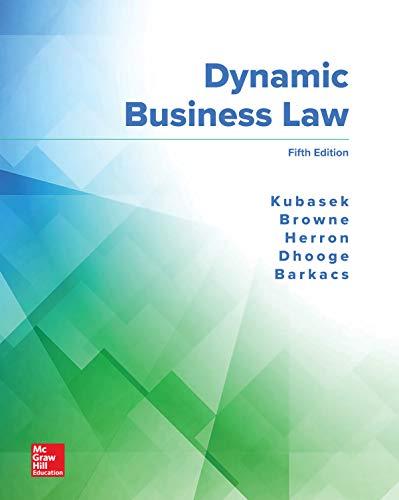MAC Trailer Manufacturing is a company that has distribution agreements covering most of the states in the
Question:
MAC Trailer Manufacturing is a company that has distribution agreements covering most of the states in the United States. MAC had a distribution agreement with two companies in relatively close proximity to each other. One company, Black Hills Truck and Trailer was located in Rapid City, South Dakota. The other company, Siouxland Trailer Sales, Inc., was located in Sioux City, Iowa. Siouxland’s agreement with MAC was made in 2010 and gave it responsibility over the western two-thirds of Iowa. MAC formed an agreement with Black Hills in 2012 and gave Black Hills an area of responsibility in several South Dakota and Nebraska counties. The agreement also let Black Hills establish a dealership in Rapid City. Three months after MAC formed its distribution agreement with Black Hills, the owner of Siouxland, Gary March, sent an email expressing anger about Black Hill’s dealership to the vice president of sales for MAC, Steve Hallas. March wrote in his email, “If I see he has taken us out of one deal I will find a new supplier [sic] DO not take this as a threat is a promise.” Over the following months, March and Hallas exchanged more emails casting aspersions on Black Hills and its business practices. The emails culminated in a complaint by March stating that Black Hills was encroaching on Siouxland’s area of responsibility.
Hallas then communicated with Black Hills that MAC was looking to amend its dealer agreement with several conditions. These conditions restricted the types of MAC products Black Hills could sell compared to the original agreement. Black Hills would also forfeit its area of responsibility in Nebraska. Finally, Hallas informed Black Hills by mail that MAC would not accept anymore orders until the adjusted dealer agreement was signed.
Black Hills then filed an action against MAC alleging breach of contract, breach of good faith and fair dealing, and a claim for violation of the Robinson-Patman Act. Black Hills contends it experienced secondary-line injury as the result of MAC and Siouxland’s actions. What are the criteria for secondary-line injury in a Robinson-Patman claim? Do you think Black Hills’ argument that MAC caused secondary-line injury when it attempted to convince Black Hills to restrict its sales area and impose restrictive rules and give the Nebraska counties formerly under Black Hills to Siouxland? How did the court decide?
Step by Step Answer:

Dynamic Business Law
ISBN: 9781260247893
5th Edition
Authors: Nancy Kubasek, M. Neil Browne, Daniel Herron, Lucien Dhooge, Linda Barkacs





